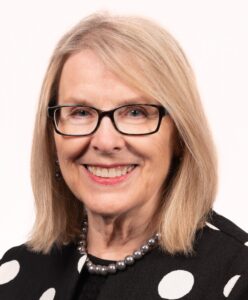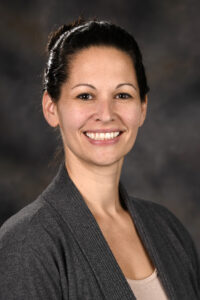

When Patricia (Patty) Baskin attended her first CSE meeting back in 1995, she felt very alone: “No one really said hello to me,” she recalls. Nevertheless, she became actively involved in the following years, chairing CSE’s short-course program, presenting at annual meeting sessions, and becoming Science Editor Editor-in-Chief. She also vowed to make everyone drawn to CSE feel supported.
Then, as CSE president in 2017, Baskin took the lead in creating the Mentorship Committee. “This was a way to help our new members feel they belonged in CSE, on a more individual basis, and an opportunity for established members to stay involved,” Baskin said. “The mentorship program is a great way to build relationships and foster growth, for both the mentor and mentee.”
Through CSE, Baskin has mentored at least 5 people, and she remains open to more. In 2018, she mentored Kristin Inman, then a science editor who had just recently transitioned from being a postdoctoral fellow.
The Mentorship
Listening to a panel of mentors and mentees at her first CSE annual meeting in 2018, Inman knew the mentorship program was right for her. “I wanted to break into and establish myself in the realm of scholarly publishing and editing,” Inman said, “and I wanted someone more advanced in their career to guide me in the right direction.”
When they were first paired, Baskin remembers, she instantly knew Inman would be successful. “She was very good at identifying what her objectives were and putting them into priority,” she recalls. “We would take things one goal at a time, and she would always think them through.”
The mentorship consisted of holding monthly phone calls and listing achievable goals to complete by the end of the program. Inman recalls feeling nervous initially, thinking: What if we get on and there is nothing to talk about? What if she has nothing to teach me?
The calls, however, were always productive—often exceeding the scheduled hour. Baskin, then the Executive Editor at the American Academy of Neurology, introduced Inman to other professionals with similar interests. She and Inman regularly corresponded by email, with Baskin responding to Inman’s questions or concerns. “After a while, I felt at ease with Patty,” Inman said. “She is very maternal and reassuring.”
Baskin viewed her main responsibility as a mentor as being a sounding board for Inman. “Being there to understand uncertainties or fears is important; listening is important,” Baskin said. “Letting Kristin know she was not alone, and that there were connections she could utilize, gave her a sense that there’s a place for her somewhere—she just had to find it.” And Inman has indeed found her place, establishing herself as an integral editor at Environmental Health Perspectives, securing long-term, part-time employment with Elsevier, and recently transitioning to an ethics and partner publishing manager for the American Physiological Society.
Some Reflections: Inman
Inman said the most memorable takeaways from her mentorship were to network (as much as possible!), to know how to market yourself in an ever-evolving job market, and to have confidence in transferable skills.
Some other reflections:
- Don’t pigeonhole yourself. “You’re a conglomerate of your skills—so don’t put yourself in an isolated box. Your skill set can be applied to so many different things. And as an editor who has had many hats, it makes you marketable to many other positions, and there’s always other areas to grow in.”
- Always make new connections. “Reach out to people, even if you might be afraid to do so. People genuinely want to help and connect with you, and networking is the best way to expand your reach.”
- You’re not an imposter. “If you feel like you are not qualified for something, it’s not that you can’t do it, but rather you need to apply your skills differently. Patty helped me see that. Reframe your negative thoughts.”
- Practice adaptability. “Science editing means many different things; it’s kind of what you make it. There’s not a unified definition, and it’s frustrating, but you must roll with those punches.”
Inman has now been a mentor herself for several years, finding the experience a two-way street: “I learned just as much from my mentees as I learned from my mentor.”
Some Reflections: Baskin
Baskin, who is now Deputy Chief for Publications at the American Academy of Neurology and remains very active in CSE, recalls finding her mentorship experience with Inman fulfilling.
Some other reflections:
- Network, network, network. “I pride myself on being a connector. Each time you reach out to someone, you are strengthening that relationship. By expanding your network in CSE, and outside of it, you are opening the door to future referrals along with advancing your own professional growth.”
- Mentoring builds confidence in both the mentee and mentor. “What I enjoy about mentoring is getting a new perspective of self-awareness. I obtained a new sense of self-worth that comes from helping people in different situations, and I get to see just how much I’ve grown in my career.”
- Listen to fresh ideas. “Mentoring exposed me to fresh ideas, and I reevaluated the way I organize my responsibilities and how I felt about my skills—it made me realize that I do know what I’m doing.”
- You can be a mentor! “Many people I approach to become a mentor think they don’t know enough, but that’s just not true. Anyone with experience, who is willing to guide another and share their ideas, can become a mentor. It’s about recognizing all that you’ve accomplished and giving voice to it for someone else.”
Baskin encourages broad involvement in the mentorship program. “Mentoring can be a great way to strengthen confidence, improve skills, and hear different perspectives,” she says.
Erin Wunderlich is a graduate student in science and technology journalism at Texas A&M University.
Opinions expressed are those of the author and do not necessarily reflect the opinions or policies of their employers, the Council of Science Editors, or the Editorial Board of Science Editor.
